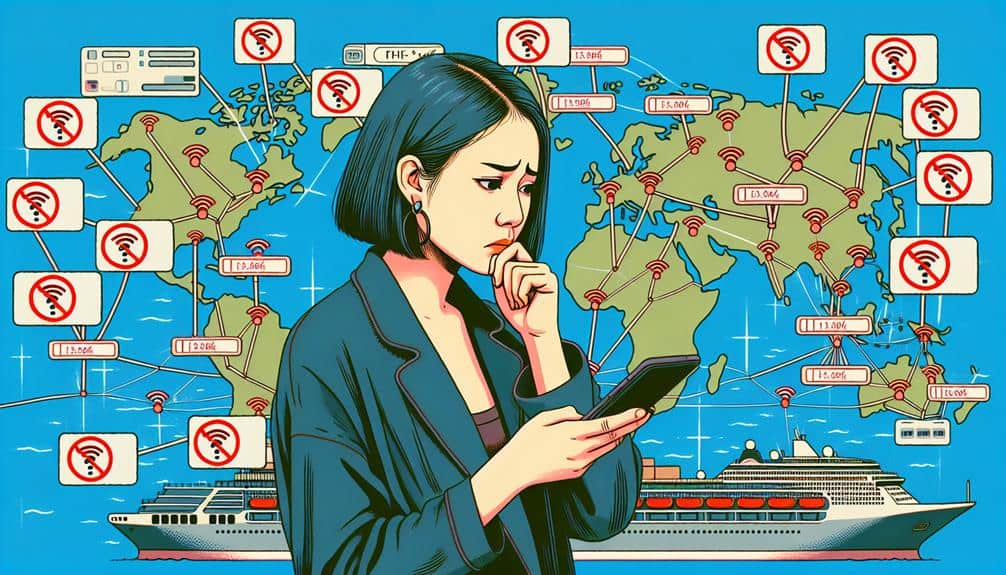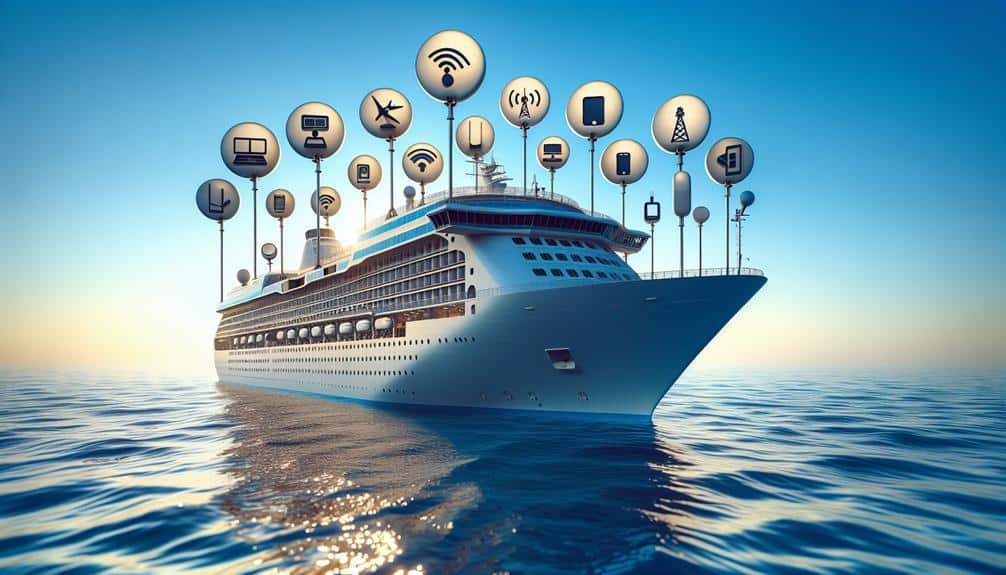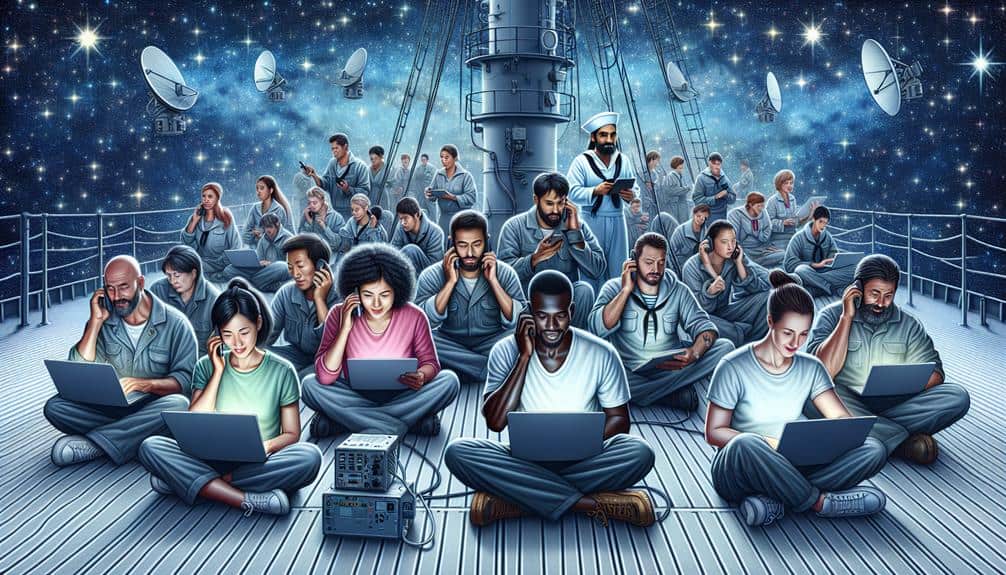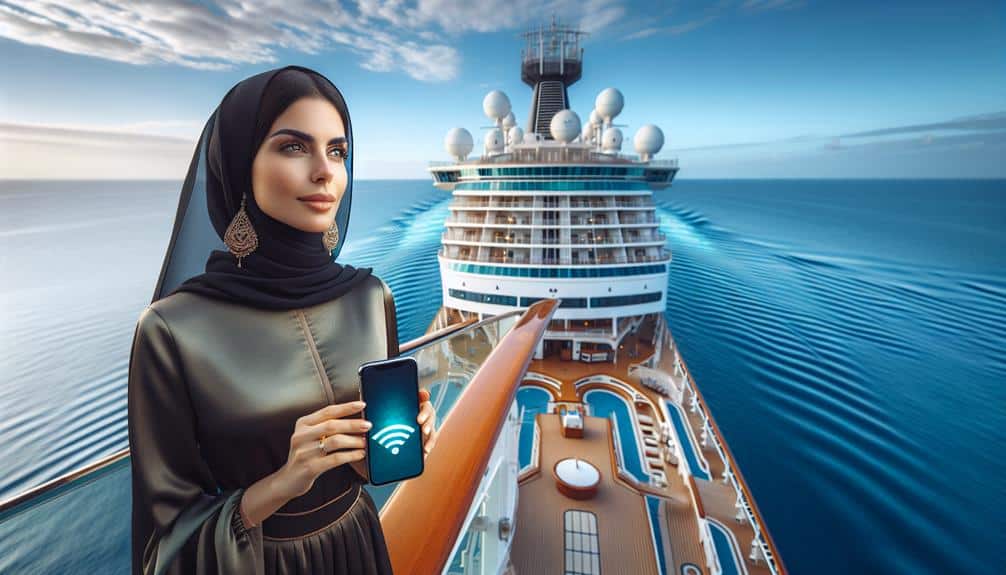When facing cruise ship internet blackout zones, plan ahead by pre-downloading content. Locate spots with better connections on the ship. Consider investing in satellite internet packages for reliable sea access. Enhance security and bypass restrictions using VPNs. Efficient resource management is essential to stay connected in remote areas.
Key Points
- Pre-download essential content to prepare for limited internet access.
- Identify ship hotspots for stronger internet connections onboard.
- Consider investing in satellite internet packages for reliable at-sea access.
- Use VPNs to enhance security and bypass blackout zone restrictions.
- Strategic planning and resource management are crucial for maintaining connectivity.
Understanding Cruise Ship Internet Limitations
Understanding the limitations of internet access on cruise ships is crucial for passengers who rely on staying connected while at sea. Bandwidth restrictions and network speeds are two critical factors that can impact your online experience onboard. Cruise ship internet connectivity is often slower and less reliable compared to what you may be accustomed to on land. Bandwidth restrictions are put in place to guarantee that all passengers have fair access to the limited network capacity available at sea. This means that streaming videos or downloading large files may be challenging due to the constrained bandwidth.
Network speeds on cruise ships can vary depending on the number of users online at any given time, the location of the ship, and the service provider. You may experience slower speeds during peak hours when many passengers are trying to connect simultaneously. It's important to manage your expectations regarding internet speeds while onboard and plan your online activities accordingly to avoid frustration. By understanding these limitations, you can make the most of the internet access available during your cruise.
Tips for Managing Data Usage
To efficiently manage your data usage while on a cruise, think about implementing smart practices that can help you stay connected without exceeding your limits. Data conservation is crucial in this situation. One effective strategy is to disable automatic updates on your devices and apps. This way, you can control when data is being used for updates. Additionally, limit streaming services and opt for downloading content before your trip to reduce real-time data consumption.
Network optimization is another important aspect to think about. Make sure to connect to the ship's Wi-Fi during off-peak hours when fewer users are online, allowing for faster speeds and more stable connections. Moreover, close background apps that may be using data without your knowledge. This simple action can greatly reduce unnecessary data consumption.
Exploring Satellite Vs. Onboard Internet
Considering the reliability and performance differences between satellite and onboard internet can greatly impact your connectivity experience while on a cruise. Satellite internet, although more expensive, offers broader coverage since it connects directly to satellites in orbit. This makes it more reliable in remote areas where onboard internet might struggle to provide a stable connection.
Onboard internet, on the other hand, typically uses a combination of satellite and land-based signals. While it may be more cost-effective, it can sometimes lead to slower speeds and limited connectivity options, especially when sailing through blackout zones.
When deciding between satellite vs. onboard connectivity options, assessing your needs for speed, reliability, and coverage is crucial. Satellite internet tends to deliver faster speeds and wider coverage, making it ideal for passengers who require a consistent and robust connection throughout their voyage. However, if cost is a significant factor and you can manage with intermittent connectivity, onboard internet might be a more budget-friendly option.
Ultimately, understanding the differences between these two options will help you choose the best connectivity solution for your cruise experience.
Maximizing Connectivity in Remote Areas
In remote areas, optimizing your connectivity on a cruise requires strategic utilization of available network resources. When seeking remote access while cruising, understanding the various connectivity solutions can enhance your online experience. To maximize connectivity in these regions, consider utilizing satellite internet services. Satellite communication enables access to the internet even in the most remote locations, offering a noteworthy connection for your browsing needs.
Moreover, investing in a high-quality onboard Wi-Fi system can greatly improve your connectivity while at sea. These systems are designed to provide seamless internet access throughout the ship, ensuring you stay connected regardless of your location onboard.
Additionally, exploring mobile network options can be beneficial when cruising near coastal areas. Some cruise lines offer packages that allow you to use your mobile data while at sea, providing an alternative connectivity solution when satellite or onboard Wi-Fi isn't available or reliable.
Overcoming Internet Blackout Challenges
Facing challenges of internet blackout on a cruise requires strategic planning and utilization of available resources to maintain connectivity. To overcome connectivity obstacles and navigate internet blackout zones effectively, consider the following strategies:
- Pre-download Essential Content:
Prior to boarding on your cruise, pre-download essential content like maps, guides, and entertainment to access offline.
- Utilize Ship Hotspots:
Identify areas on the ship where the internet connection is stronger, such as internet cafes or specific decks, to maximize connectivity.
- Opt for Satellite Internet Packages:
Invest in satellite internet packages offered by the cruise line for more reliable and faster internet access while at sea.
- Use Virtual Private Networks (VPNs):
Employ VPNs to enhance security and bypass any restrictions that may be in place, ensuring a smoother internet browsing experience despite blackout challenges.
Frequently Asked Questions
Can Cruise Ship Passengers Access Social Media Platforms While in Internet Blackout Zones?
You can typically access social media platforms while on a cruise ship, even in blackout zones. To stay connected, utilize the ship's Wi-Fi or satellite internet services. Be mindful of potential slower speeds or limited access during blackout periods.
Are There Any Specific Apps or Websites That Are Restricted During Blackout Periods?
During blackout periods on a cruise ship, certain apps and websites may be restricted for internet browsing. To communicate without these platforms, consider using alternative methods like onboard messaging systems or offline modes within apps.
How Can Passengers Communicate With Friends and Family Back Home During Blackout Periods?
During cruise internet blackouts, you can communicate with friends and family by sending postcards or using satellite phones. These methods offer reliable communication when internet access is limited, ensuring you stay connected while at sea.
Is It Possible to Access Streaming Services Like Netflix or Hulu While in Blackout Zones?
You might think streaming services like Netflix or Hulu would be a breeze in blackout zones, but alas, the internet speed won't cut it. Data usage limitations will have you rethinking your binge-watching plans.
Are There Any Alternative Methods for Accessing the Internet Aside From Onboard or Satellite Options During Blackout Periods?
You can explore offline entertainment options like pre-downloaded movies or books. Satellite communication alternatives, like portable satellite hotspots, can provide limited internet access during blackout periods. These methods offer connectivity beyond onboard services.



